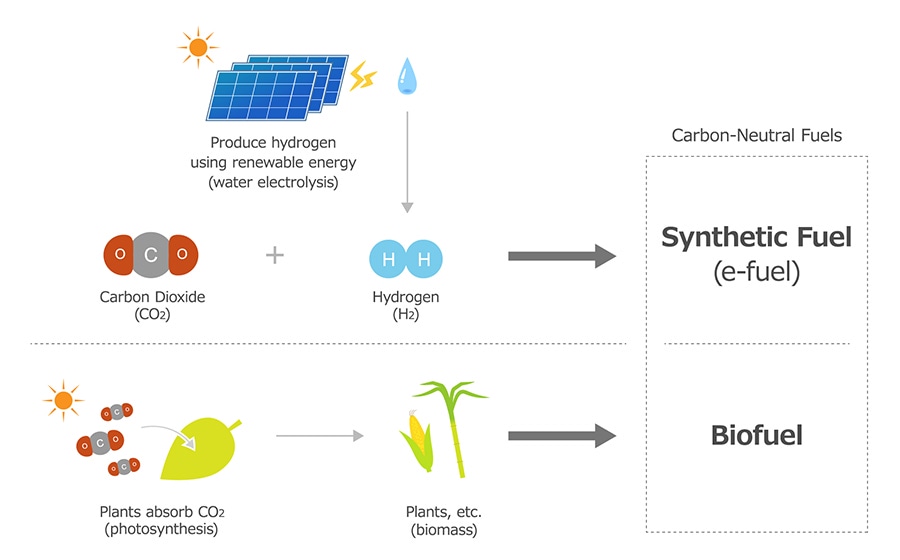Idemitsu Kosan Co., Ltd. (“Idemitsu Kosan”), ENEOS Corporation (“ENEOS”), Toyota Motor Corporation (“Toyota”), and Mitsubishi Heavy Industries, Ltd. (“MHI”) have announced the commencement of a study aimed at introducing and proliferating carbon-neutral fuels to aid in the decarbonization of automobiles, with the vision of achieving a carbon-neutral society. The consortium, with significant roles in supply, technology, and demand sectors, targets the introduction of carbon-neutral fuels in Japan by the year 2030.
Insights on Carbon-Neutral Fuels
Carbon-neutral fuels encompass a range of fuels that restrict CO2 emissions throughout their life cycles. This category includes synthetic fuels (e-fuel) produced using hydrogen and CO2, as well as biofuels derived from organic materials like plants that absorb CO2 through photosynthesis. Among these, liquid carbon-neutral fuels offer advantages in storage, transportation, and suitability as portable energy sources.

Objectives of the Collaborative Study
- Exploring and evaluating scenarios and roadmaps for introducing carbon-neutral fuels into Japan’s automobile market, as well as establishing essential systems for market integration.
- Assessing the viability of production from perspectives like Japan’s energy security.
Idemitsu Kosan’s Vision for 2050, defined as “Shaping Change,” focuses on the social implementation of a consistent supply of diverse, eco-friendly “Energy one step ahead.” This strategy falls under one of the three business domains outlined in its Medium-term Management Plan. The company is actively pushing for the early adoption and expansion of carbon-neutral fuels, including synthetic and biofuels, through collaborations with various domestic and international partners.
In its Long-Term Vision, the ENEOS Group pledges to address the dual challenges of ensuring a stable energy and materials supply while also realizing a carbon-neutral society. ENEOS is engaged in multiple initiatives to reduce greenhouse gas emissions, including the utilization of hydrogen, renewable energy sources, and the development of carbon-neutral fuels like synthetic variants.
Toyota, through a diversified approach, is pursuing carbon neutrality not only by promoting electric vehicles but also by curbing CO2 emissions from internal combustion engine vehicles. Since 2007, the company has introduced flex-fuel vehicles capable of running on both biofuels and gasoline in Brazil. Toyota’s future efforts will focus on reducing CO2 emissions from internal combustion engine vehicles, including existing models, and exploring the potential development of specialized engines for electrified vehicles to advance the adoption of carbon-neutral fuels.
MHI Group has declared its ambition for carbon neutrality by 2040 through “MISSION NET ZERO” and is actively constructing ecosystems for CO2 reduction solutions and hydrogen utilization solutions. Leveraging MHI group’s products, technologies, and services to aid in diminishing CO2 emissions, along with collaborating with global partners to devise innovative solutions, MHI aims to play a key role in realizing a carbon-neutral society.
Seeking industry-wide collaboration and partnerships as pivotal elements in the expansion of carbon-neutral fuels toward achieving a carbon-neutral society, Idemitsu Kosan, ENEOS, Toyota, and MHI have embarked on a mutual study to propel the adoption and proliferation of carbon-neutral fuels.
SOURCE: Toyota Group
